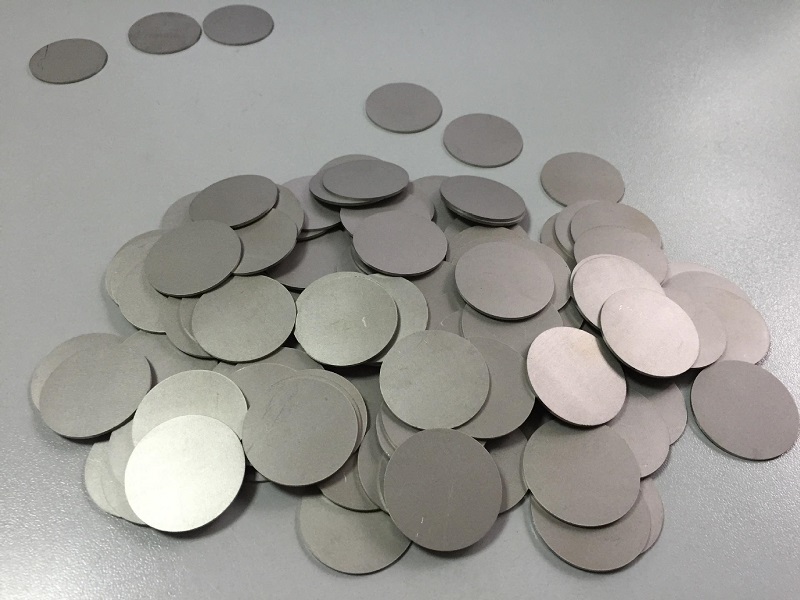Titanium Powder Metallurgy Technology: A Modern Method for Manufacturing High-Performance Titanium Materials
Powder metallurgy plays a crucial role in many significant metal production processes, particularly in the preparation of titanium materials. Due to titanium’s excellent properties – including its high corrosion resistance, low density, and exceptional mechanical characteristics – it is widely used in aviation, medical, industrial, and other areas. Titanium powder metallurgy is an efficient preparation method, providing the possibility of producing optimized titanium materials. Here is a complete workflow of titanium powder metallurgy technology:

More Resources:
Titanium – Source: Wikipedia
Titanium Alloy – Source: Wikipedia
Titanium 3D Printing – Source:JHMIM
I.Titanium Powder Preparation
Titanium powder preparation is an essential first step in the entire powder metallurgy process. The quality of titanium powder has a significant impact on the performance of the final product. Several methods have been developed to prepare titanium powder, including electrochemical reduction, gas reduction, and mechanical methods. Each method has its strengths and limitations, and we need to choose the most suitable one based on the desired product performance.
II. Shaping and Titanium Sintering
Shaping and sintering are the core steps in the titanium powder metallurgy process. First, the material is transformed into a uniform and dense rectangular blank through compaction and pre-sintering. Then, high-temperature sintering takes place to further densify the material, creating inter-particle connections to form a continuous matrix. This process turns the initially loose titanium powder into a product with high hardness and bending strength.
III. Post-treatment and Performance Adjustment
After sintering, some post-treatment is often necessary to optimize product performance. The original sintering parameters (such as porosity, particle size, etc.) may not directly meet our material performance requirements. Therefore, it is possible to further improve the characteristics of the material by changing these parameters or adopting heat treatment or surface treatment methods.
Titanium powder metallurgy technology is continually improving and developing to meet the demands of manufacturing high-performance titanium products. The advancements in this technology not only contribute to enhancing product quality but also further drive technological progress in application areas such as aviation, industry, and medicine. Our understanding and application of powder metallurgy technology are still expanding, and we believe the future will bring even broader and more in-depth applications of powder metallurgy in titanium materials preparation.
Titanium alloys are composed of titanium as the base element and other elements (such as aluminum, vanadium, manganese, iron, zirconium, molybdenum, tin, etc.). Depending on the elements added, the properties of titanium alloys may vary. Here are some commonly used elements in titanium alloys:
- Aluminum (Al): Usually used together with vanadium as a stabilizing element to enhance the strength and hardness of titanium alloys. Aluminum can also improve the temperature stability of the alloy, allowing the titanium alloy to withstand high-temperature environments.
- Vanadium (V): Combined with aluminum, it can enhance the strength and toughness of titanium alloys. Consequently, the addition of aluminum and vanadium is a common practice in producing high-strength titanium alloys.
- Manganese (Mn): Used to improve the processing performance of titanium alloys, enhancing their behavior during mechanical processing.
- Iron (Fe): As a low-cost alloying element, iron is used to increase the strength of titanium alloys. Although iron can reduce the corrosion resistance of titanium alloys, an appropriate amount added can achieve a balance between cost-effectiveness and performance.
- Zirconium (Zr): The addition of zirconium improves the high-temperature stability of titanium alloys and enhances their mechanical properties.
- Molybdenum (Mo): For titanium alloys required to withstand even higher temperature environments, the addition of molybdenum is necessary. It can increase the high-temperature structural stability of the alloy.
- Tin (Sn): Tin is a stabilizing element in many commercial titanium alloys, used to improve the mechanical properties of the alloy.
In summary, adding different elements to titanium can significantly change its properties to better meet various application requirements.

Titanium Alloy Metallurgy: Revolutionary Materials and Their Extensive Applications
In the field of materials science and engineering, titanium alloy metallurgy is undoubtedly a unique and highly potent technology. As an excellent high-strength, corrosion-resistant alloy, titanium has become a favorite in many industrial sectors. Here are some fascinating examples of application areas, demonstrating the transformative influence of titanium alloys.
In the aerospace sector, titanium metallurgy has taken the lead. Due to their outstanding strength-to-weight ratio, heat resistance, and corrosion resistance, they have become the ideal choice for space exploration and aircraft components. For example, Airbus and Boeing airplanes have widely adopted titanium alloys in critical areas, such as gas turbines and aerodynamics.
In the medical field, titanium alloys stand out due to their excellent biocompatibility, mechanical properties, and corrosion resistance, making them the perfect material for medical devices and prosthetics. Examples of titanium alloy applications include the casings of pacemakers, dental implants, artificial joints, and bone-fixing devices.
Titanium alloys can effectively reduce vehicle weight and improve fuel efficiency. From high-performance car engine components to standard passenger vehicle frames, titanium alloys are increasingly being adopted. In particular, they display unrivaled advantages in the manufacturing of high-performance, high-quality cars and motorcycles.
-
Marine Industry
The corrosion resistance of titanium alloys lends itself to a wide range of applications in marine environments. This material can be used to manufacture pipelines for desalination equipment, effectively tackling the corrosion challenges posed by seawater. Additionally, marine drilling equipment and submarine hulls have also turned to titanium alloys.
-
Sports Equipment
Sports equipment is another popular application area for titanium alloys. More and more high-end bicycles, golf clubheads, and snowboards are choosing to incorporate titanium alloy materials, expecting to achieve greater performance and durability improvements.
In conclusion, the applications of titanium alloy metallurgy are growing in number and diversifying in the market. Undoubtedly, as the technology of titanium alloy metallurgy advances, the application prospects in different fields will become even broader. As the material of the future, titanium alloys will play a key role in deepening our understanding of materials science and driving technological progress.
Tags Manufacturing Process | Design | Tooling



